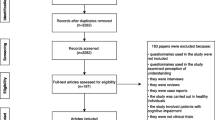Abstract
Definiton of the problem: The current literature concerning the topic of ”informed consent” confronts physicians with a growing demand for extended and sophisticated disclosure duties. Often enough they hardly seem to be feasible, not least because of an actual lack of personnel and time. The problem is to find a realisable way to balance these theoretical and practical considerations. Arguments: The fundamental idea of the concept presented here consists of using the difficulty of a certain decision as standard for determining the required extent of the patient’s actual decisional autonomy. As the prominent aspect of this difficulty of decision-making, the occurrence of conflicting values – termed ”value concurrence”– is identified. Conclusion: Structuring physician-patient-communication in accordance with this ”value-concurrence” should prove to be applicable in the clinical context without neglecting important ethical reflections.
Zusammenfassung
Mit der Frage, unter welchen Bedingungen die Entscheidung eines Patienten als hinreichend autonom und sein Informed Consent damit als valide betrachtet werden darf, wird ein Kernproblem der Medizinethik an- gesprochen. In der aktuellen Literatur mehren sich in diesem Zusammenhang die Forderungen nach immer differenzierteren Aufklärungsverpflichtungen des Arztes. Dabei wird übersehen, dass diese im klinischen Alltag aufgrund der begrenzten zeitlichen und personellen Ressourcen kaum zu realisieren sind. In dieser Arbeit wird ein Konzept beschrieben, das eine bedarfsgerechte Aufklärung ermöglichen soll. Seine Leitidee besteht darin, die Schwierigkeit einer Entscheidung als Maßstab für die Bestimmung der in dem jeweiligen Kontext als hinreichend geltenden Entscheidungsautonomie zu definieren. Der Schwierigkeitsbegriff wird über die der Entscheidungssituation zuzuordnenden Wertekonkurrenz, d.h. der Anzahl und dem Gewicht der eine Entscheidung mitbeeinflussenden Werte, expliziert. Auf dieser Grundlage wird ein Algorithmus entwickelt, der das Aufklärungsgespräch in Abhängigkeit von dieser Wertekonkurrenz strukturiert und dimensioniert.
Similar content being viewed by others
Author information
Authors and Affiliations
Rights and permissions
About this article
Cite this article
Dziewas, R., Sörös, P. & Henningsen, H. Informed Consent im klinischen Alltag – eine pragmatische Interpretation. Ethik Med 14, 151–159 (2002). https://doi.org/10.1007/s00481-002-0165-6
Published:
Issue Date:
DOI: https://doi.org/10.1007/s00481-002-0165-6




